

7 Reasons You Don’t Have to Pay a Pet Deposit for an Emotional Support Animal
by Lena Park
Last updated: August 17, 2025
Verified and Approved by:
Angela Morris,
MSW, LCSW
Fact Checked

Overview
This article addresses a significant concern for many individuals: the necessity of paying a pet deposit for an emotional support animal (ESA). It emphasizes that under the Fair Housing Act, such deposits are not required.
For those facing mental health challenges, ESAs serve as essential companions, providing comfort and support during difficult times. It is crucial to recognize that landlords are legally required to accommodate these animals without imposing additional fees.
This legal protection reinforces tenants’ rights, allowing them to live with their emotional support animals without the added financial burden. By understanding this, we can foster a more compassionate environment for those in need.
Introduction
Navigating the world of housing with an Emotional Support Animal (ESA) can be challenging and often filled with uncertainty. Many individuals find themselves grappling with the question: do you have to pay a pet deposit for an emotional support animal? As awareness grows about the vital role ESAs play in supporting mental health, it becomes increasingly important to understand the legal protections surrounding them, both for tenants and landlords.
This article explores the reasons why many individuals are exempt from pet deposits, shedding light on the Fair Housing Act, common misconceptions, and offering practical guidance for asserting one’s rights.
What challenges do tenants encounter when advocating for their beloved companions? How can they ensure their needs are met without incurring unnecessary costs? Together, we will navigate these concerns, fostering a sense of support and understanding.
Wellness Wag: Quick ESA Letters to Avoid Pet Deposits
At Wellness Wag, we understand the emotional challenges that individuals with mental health issues face daily. Securing housing or travel accommodations can be incredibly stressful, particularly when you wonder, do you have to pay a pet deposit for an emotional support animal? That’s why we offer a streamlined process for obtaining Emotional Support Animal (ESA) letters, ensuring that you receive your documentation quickly—often within just 24 hours of your consultation. This rapid turnaround is designed to alleviate some of your worries, allowing you to focus on what truly matters.
To begin this journey, clients take a brief assessment to share their unique emotional support needs. This allows us to tailor our services specifically to you. Once the required forms are submitted, you will be connected with licensed medical professionals for a personalized consultation and thorough evaluation to assess your eligibility for an ESA. Upon confirmation, you will receive valid ESA letters that comply with legal requirements, making it easier to advocate for your rights as a pet owner with mental health challenges.
Mental health professionals emphasize the vital role these letters play in securing housing, particularly in relation to whether do you have to pay a pet deposit for an emotional support animal. They confirm the necessity of an ESA for emotional support, ensuring compliance with the Fair Housing Act. Imagine the peace of mind that comes with knowing you have the support you need. At Wellness Wag, we are here to help you navigate this process with compassion and understanding, ensuring that you feel cared for every step of the way.
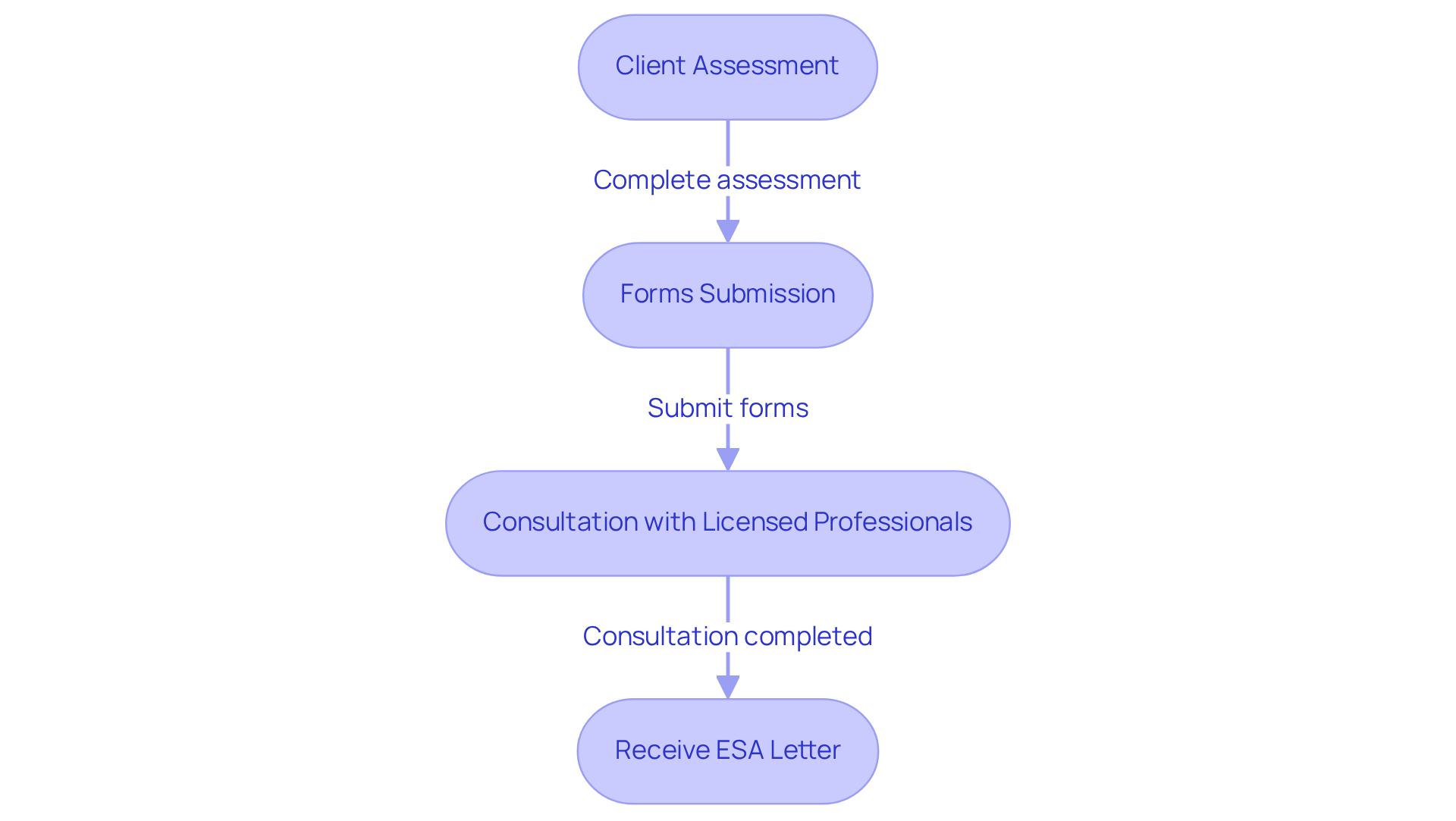
Fair Housing Act: Landlord Obligations for Emotional Support Animals
Under the Fair Housing Act (FHA), property owners are required to provide reasonable adjustments for tenants with Emotional Support Animals. This legal framework recognizes that emotional support animals are not merely pets; they serve as essential companions for individuals grappling with mental health challenges. As such, when considering if you do have to pay a pet deposit for an emotional support animal, they are exempt from pet deposits or additional fees.
It’s vital for landlords to assess ESA requests on an individual basis, ensuring that decisions are not solely dictated by existing pet policies. Many property owners have shown compassion by waiving pet fees and allowing these cherished animals in no-pet buildings, acknowledging their significant role in alleviating emotional distress.
Current expert opinions highlight the importance for property owners to familiarize themselves with ESA regulations to prevent potential discrimination claims. Sadly, a significant number of landlords mistakenly impose pet deposits, leaving many to wonder do you have to pay a pet deposit for an emotional support animal, despite the FHA’s clear guidelines against such practices.
Understanding these obligations is essential for tenants who aspire to live with their emotional support animals without the burden of financial strain, ensuring their rights are upheld and respected. This awareness fosters a more inclusive environment where individuals can thrive alongside their supportive companions.
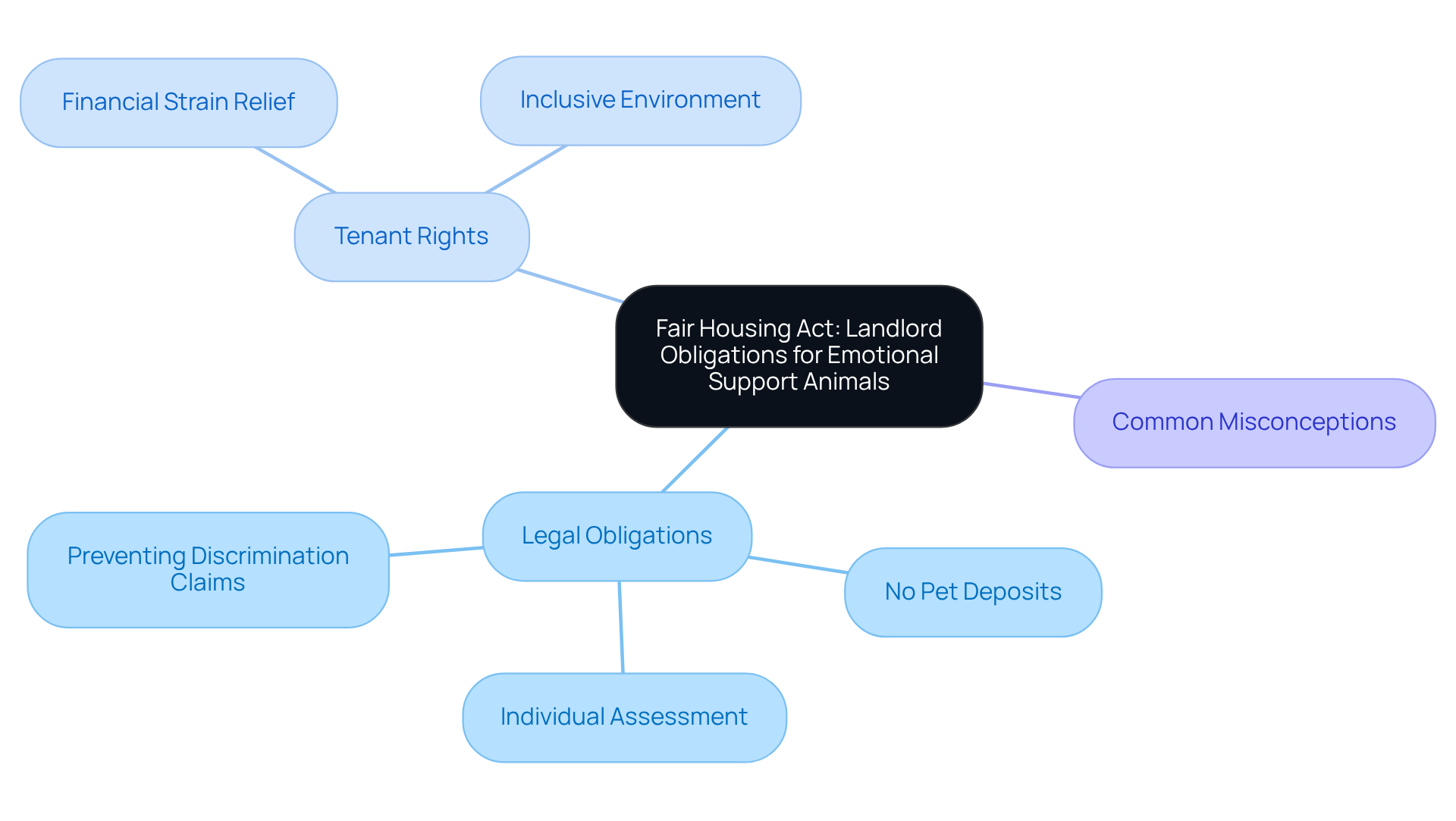
Emotional Support Animals vs. Pets: Understanding the Differences
Emotional Support Animals (ESAs) are recognized for their profound therapeutic benefits, especially for those navigating the complexities of mental health conditions. Many individuals face emotional challenges such as anxiety, depression, and PTSD, and it can be incredibly difficult to cope alone. Unlike typical pets that primarily offer companionship, ESAs are recommended by licensed mental health professionals specifically to help alleviate these symptoms. This distinction is vital, as it supports the legal protections afforded to ESAs and raises the question of do you have to pay a pet deposit for an emotional support animal, allowing individuals to live with these supportive companions without incurring extra charges or deposits.
Under the Fair Housing Act (FHA), property owners are obligated to accommodate residents with registered emotional support animals, even in no-pets buildings, provided that the necessary documentation is submitted. It’s crucial to understand that the Americans with Disabilities Act (ADA) does not extend protections to emotional support animals, setting them apart from service animals. When considering if do you have to pay a pet deposit for an emotional support animal, it’s important to note that landlords cannot impose additional fees or deposits for ESAs, and if they refuse to accommodate these animals without lawful reasons, they may face penalties of up to $75,000. Additionally, landlords must seek verification of the disability need from a reputable source.
This legal framework underscores the essential role that ESAs play in enhancing the well-being of individuals facing mental health challenges. They are not just pets; they are vital companions that strengthen the rights of residents to maintain their therapeutic relationships. If you’re feeling overwhelmed, remember that support is available, and an ESA could be the compassionate solution you need to help navigate your journey toward healing.
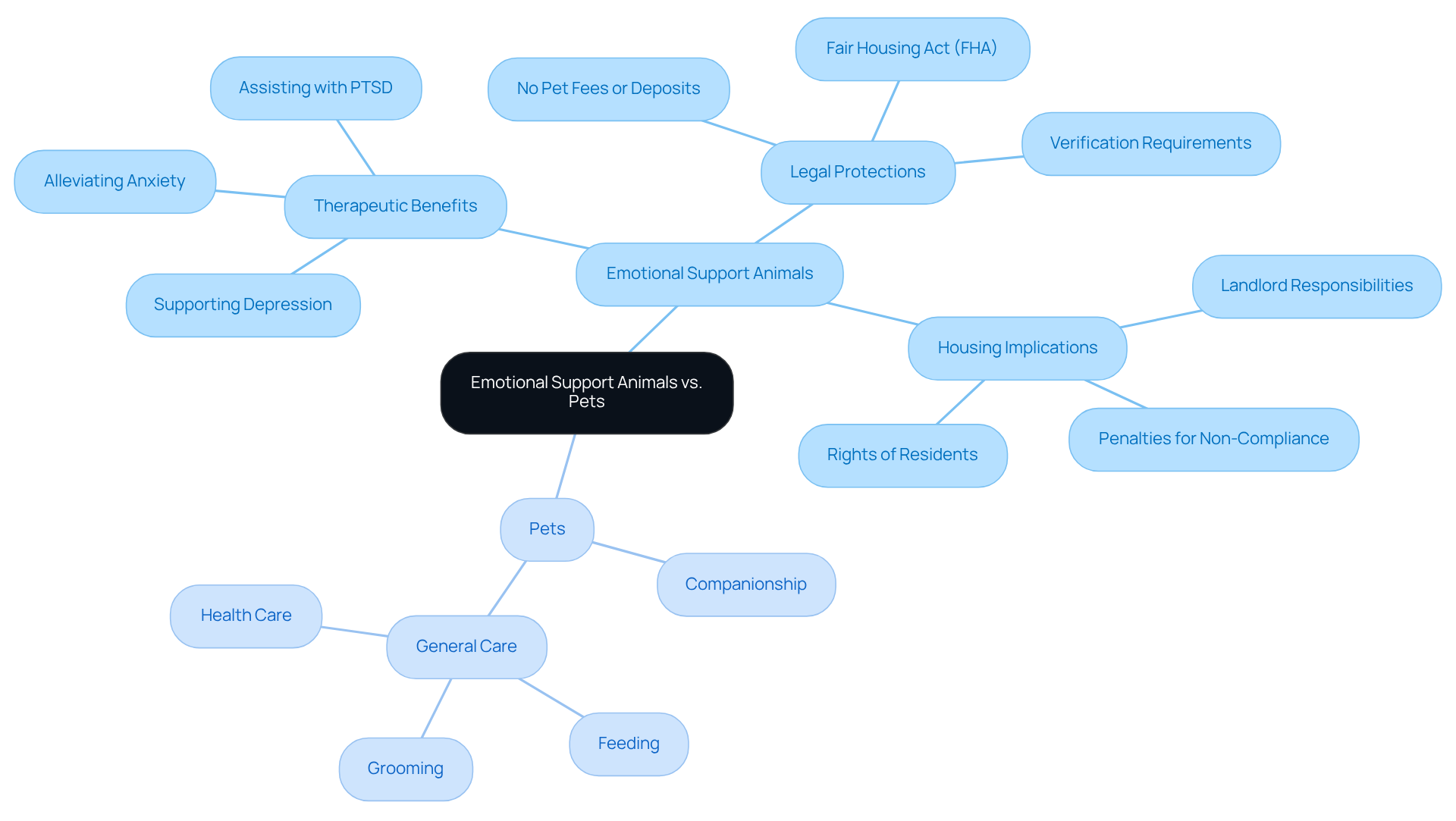
ESA Documentation: What Landlords Can Request
For many individuals facing emotional challenges, the journey can feel overwhelming. Landlords play a crucial role in this process, as they are entitled to request specific documentation to verify the legitimacy of an Emotional Support Animal (ESA). This documentation primarily consists of an authentic ESA letter from a certified mental health expert, clearly articulating the individual’s need for their beloved animal. It’s important to note that landlords cannot demand extensive medical records or personal information beyond what is necessary to confirm the ESA’s role. This limitation is vital for protecting resident privacy and ensuring compliance with legal standards.
As we look ahead to 2025, valid ESA letters will need to include the licensed mental health professional’s (LMHP) license number, date, and official letterhead. This requirement reinforces the legitimacy of the request and helps to ease any concerns. Understanding these boundaries empowers tenants to navigate the documentation process effectively, ensuring their rights are upheld. By fostering a harmonious living environment, we can all contribute to a space where emotional support is not just recognized but cherished. Remember, you are not alone in this journey, and the support you need is available.
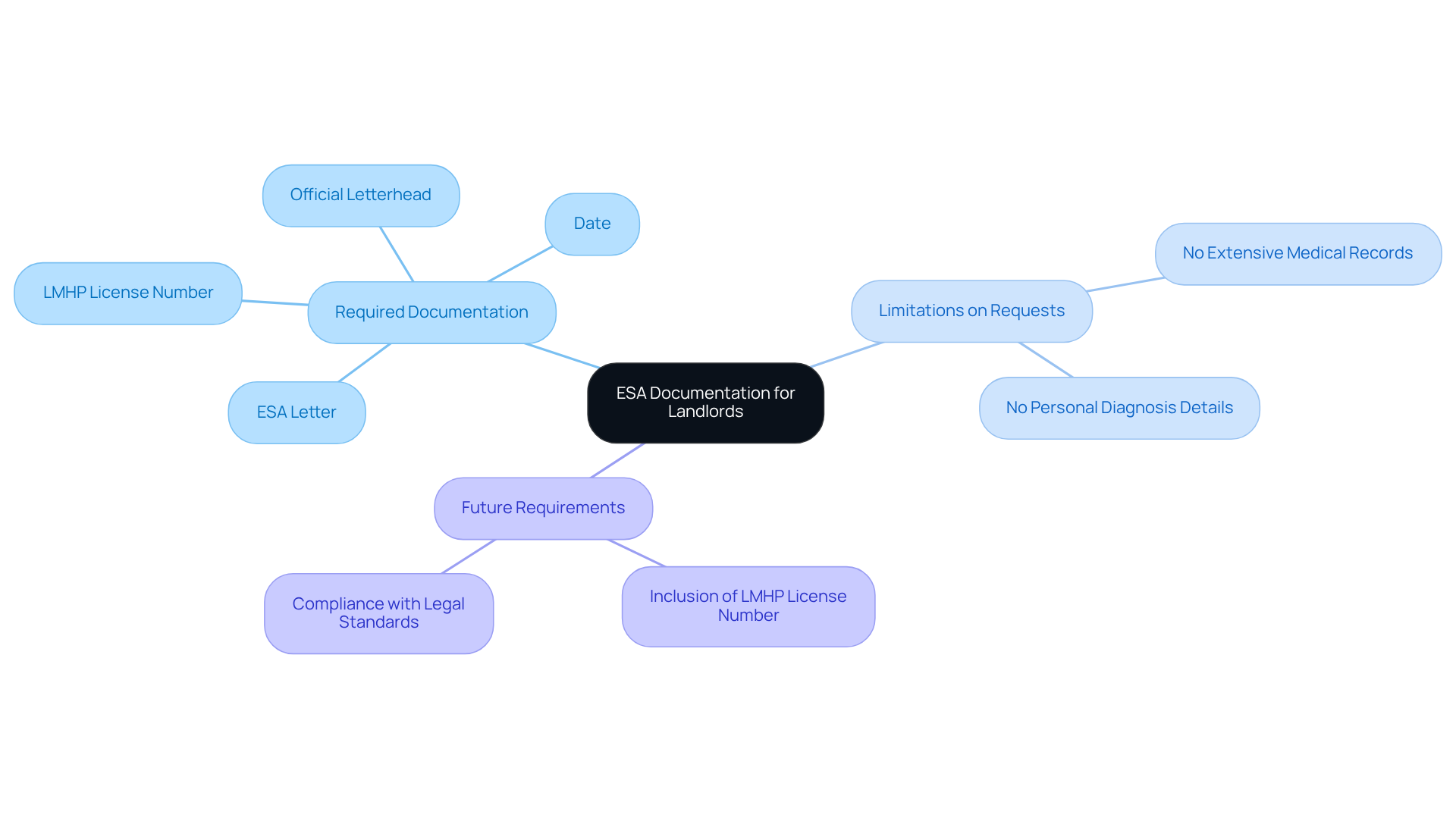
Financial Considerations: Landlord Costs and ESA Pet Deposits
Landlords are prohibited from charging pet deposits for Emotional Support Animals (ESAs), so do you have to pay a pet deposit for an emotional support animal if they provide therapeutic support rather than acting as typical pets? This legal protection, grounded in the Fair Housing Act, acknowledges the necessity of emotional support animals for individuals facing mental health challenges, raising the question of whether you do you have to pay a pet deposit for an emotional support animal. As a result, tenants can assert their rights and alleviate the financial burdens often associated with pet ownership in rental properties.
It’s important to recognize that around 76% of property managers allow pets, yet 92% of pet-friendly properties impose restrictions on types, sizes, and breeds of animals. However, these limitations do not apply to emotional support animals, highlighting the complexity of pet policies and the need for property owners to navigate these regulations with care. The financial implications of ESA policies can be significant; property owners who comply with the law not only avoid potential discrimination lawsuits but also foster a more inclusive environment for all residents.
Property management experts emphasize that accommodating emotional support animals can lead to greater resident satisfaction and retention. Logan Miller, a recognized expert in property management, notes that “most property owners understand that accommodating pet owners while preserving a tranquil residential community can be a challenging balancing act.” By understanding the regulations surrounding emotional support animals, property owners can mitigate risks and enhance their property’s appeal, ultimately benefiting both occupants and property owners alike.
In this journey, it’s essential to remember that support is available, and understanding these regulations can make a significant difference in the lives of those who rely on the companionship of their emotional support animals.
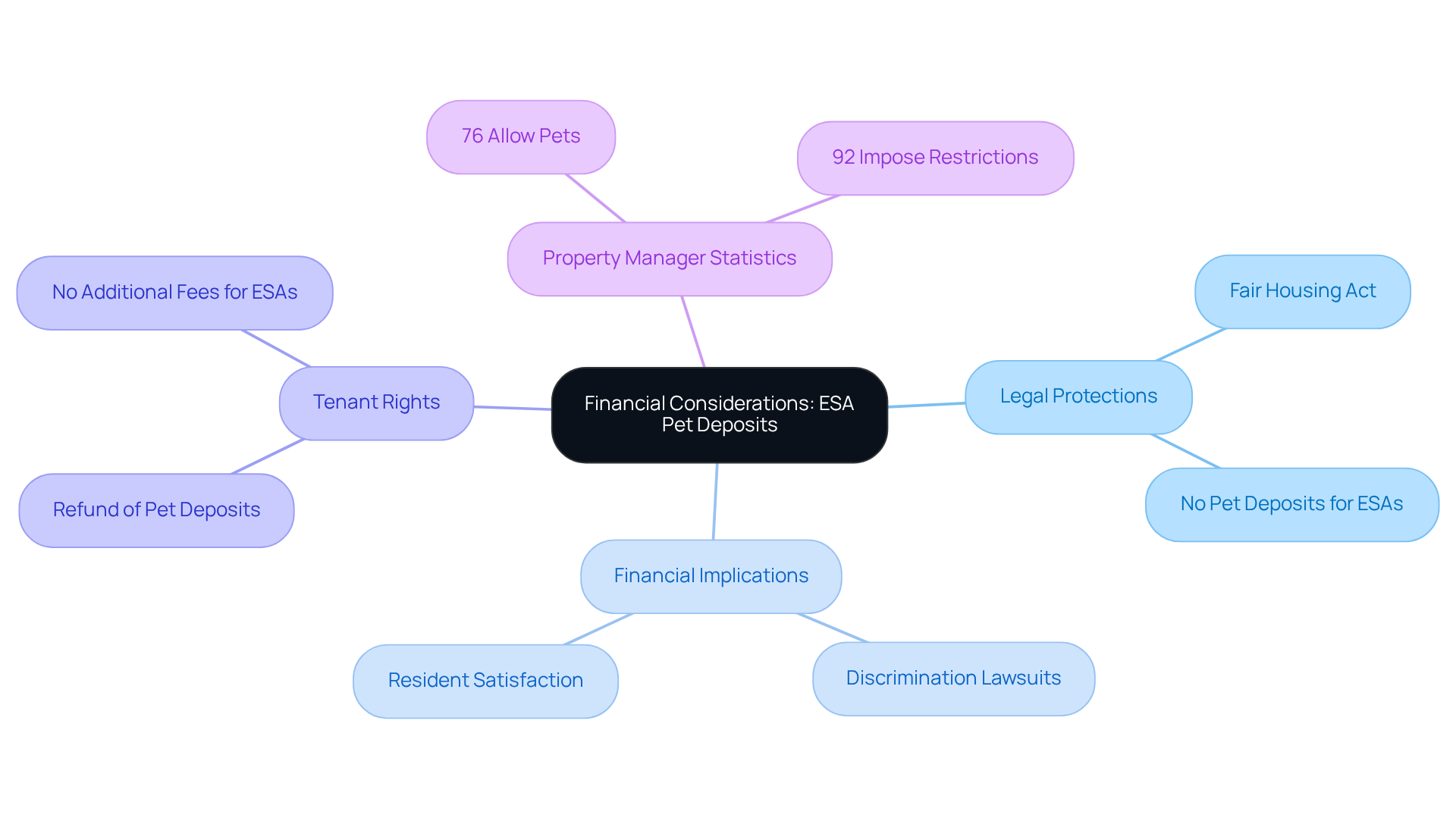
Myths About Emotional Support Animals: What You Should Know
Many individuals face emotional challenges that can be overwhelming, and the myths surrounding Emotional Support Animals (ESAs) often add to this confusion for both tenants and landlords. A prevalent misunderstanding is that emotional support animals require specialized training akin to that of service animals. In reality, emotional support animals do not need specific training; their primary role is to provide emotional assistance to their owners. This distinction is crucial, as it underscores the unique contribution of emotional support animals to mental health without the extensive training that service dogs undergo.
Another common misconception is regarding whether do you have to pay a pet deposit for an emotional support animal, as landlords may not charge fees for them. However, under the Fair Housing Act, the question of do you have to pay a pet deposit for an emotional support animal is not allowed. Landlords are obligated to accommodate emotional support animals without imposing additional pet deposits or fees, raising the question of do you have to pay a pet deposit for an emotional support animal, as they acknowledge the vital support these animals provide to individuals facing mental health challenges. This legal protection empowers tenants to advocate for their rights with confidence.
Statistics indicate that a significant portion of the public remains unaware of the training requirements for emotional support animals, leading to misconceptions about their rights. Mental health professionals stress the importance of education in dispelling these myths, asserting that a legitimate ESA letter from a licensed practitioner suffices to validate the need for an emotional support animal.
At Wellness Wag, we understand the emotional journey of obtaining an ESA letter, and we are here to facilitate that process, ensuring individuals can confidently navigate their rights and responsibilities. Our clients have shared their uplifting experiences: “Wellness Wag made getting an Emotional Support Animal a breeze. The team was extremely encouraging and beneficial during the procedure,” shares Linda S. By fostering awareness and understanding, we empower individuals to advocate effectively for their needs regarding emotional support animals.
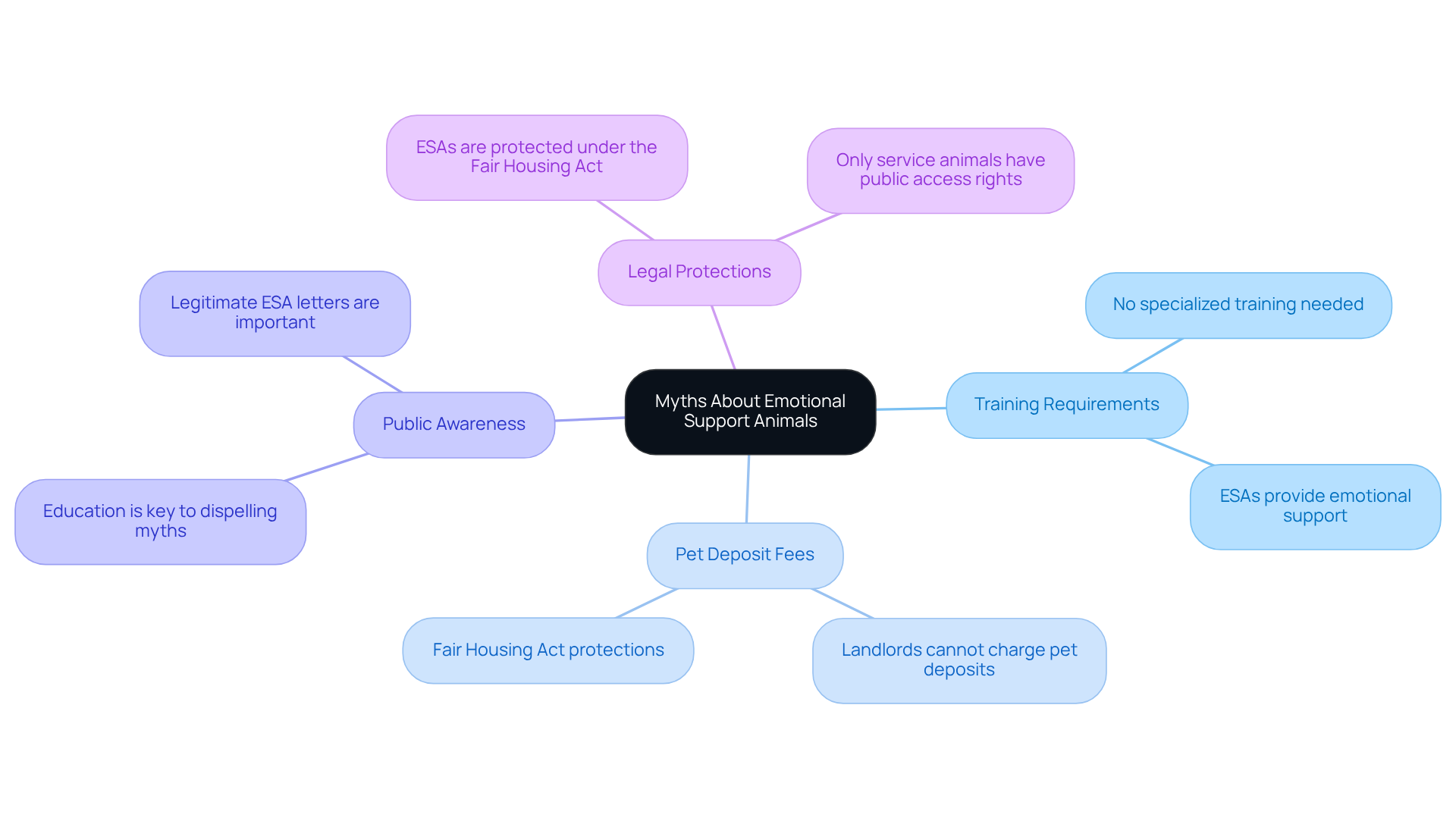
Tenant Rights: What You Can Demand for Your ESA
Navigating the complexities of housing can be particularly challenging for individuals with mental health issues. Tenants have the right to request reasonable accommodations for their Emotional Support Animals, which raises the question: do you have to pay a pet deposit for an emotional support animal, allowing them to live with their beloved companions without incurring extra charges? It’s important to understand that under the Fair Housing Act, property owners cannot charge extra fees, so do you have to pay a pet deposit for an emotional support animal, considering these animals are not classified as pets? This recognition is crucial for fostering a supportive environment.
When facing potential obstacles, tenants can advocate for their rights by ensuring that property owners assess their requests fairly and without bias. If a property owner denies an ESA request, renters have the option to seek legal recourse, reinforcing their rights and protections. This process may feel daunting, but it is essential to remember that many individuals have successfully navigated similar challenges, emphasizing the power of informed advocacy.
Studies reveal that a significant percentage of renters advocate effectively for ESA accommodations, illustrating the positive impact of standing up for one’s needs. Legal professionals stress that residents can demand a fair evaluation of their ESA requests, highlighting that landlords must document any reasons for denial to avoid potential discrimination claims. This is a vital safeguard for tenants, ensuring their voices are heard.
Effective advocacy examples demonstrate how individuals have overcome these hurdles, ensuring their emotional support needs are met while adhering to legal standards. It’s a journey that many have taken, and with the right support and information, you too can navigate this path with confidence. Remember, you are not alone in this process, and there are resources available to help you along the way.
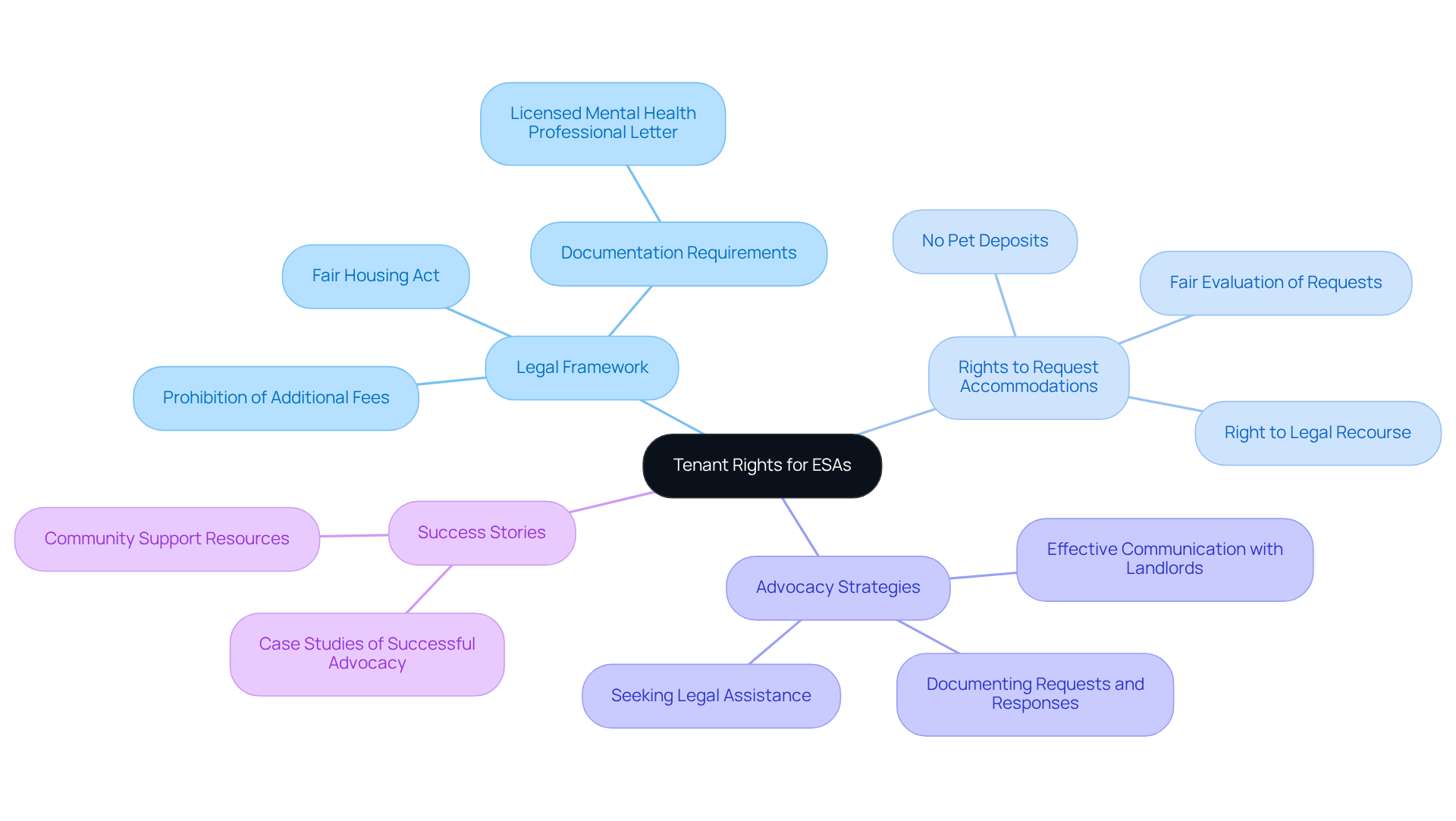
Exceptions to the Rule: When Landlords Can Charge Pet Deposits
Navigating the complexities of housing with Emotional Support Animals (ESAs) can be challenging, especially when it comes to understanding the protections offered by the Fair Housing Act. While this act provides important safeguards regarding whether you do have to pay a pet deposit for an emotional support animal, it’s crucial to recognize that these animals differ significantly from service dogs in terms of legal rights and access. This distinction can lead to confusion and concern, especially about whether do you have to pay a pet deposit for an emotional support animal and how property owners may approach this issue.
Unlike service dogs, ESAs do not enjoy the same legal protections under the Americans with Disabilities Act (ADA). This difference can create uncertainty for tenants regarding whether do you have to pay a pet deposit for an emotional support animal, as property owners may have varying policies regarding fees. It’s important to note, however, that there are exceptions. For example, if an ESA causes damage to the property or poses a direct threat to others, property owners may have valid reasons to charge for repairs or additional fees. Yet, these situations must be backed by clear evidence; property owners cannot impose fees based solely on the presence of an ESA.
Understanding these nuances is vital for tenants as it empowers them to navigate potential disagreements with property owners. By grasping the legal landscape surrounding ESAs, individuals can better advocate for their rights and seek the support they need. Remember, you are not alone in this journey, and there are resources available to help you manage these challenges with confidence and compassion.

Local Laws: How They Affect ESA Pet Deposit Policies
Local laws play a crucial role in shaping the policies related to emotional support animals, including whether you have to pay a pet deposit for an emotional support animal. For individuals with disabilities, an Emotional Support Animal can provide much-needed comfort, alleviating symptoms related to their condition and supporting their mental health. This ensures equitable access to housing, which is essential for overall well-being. Many states and municipalities have enacted regulations that offer additional protections for ESA owners, often surpassing federal guidelines. For instance, the Fair Housing Act raises the question of whether you have to pay a pet deposit for an emotional support animal, as it prohibits property owners from charging such deposits for assistance animals. However, some states, like Montana, allow landlords to request supporting documentation regarding the individual’s need for an ESA, while still forbidding inquiries about the specifics of the individual’s disability.
Statistics reveal that approximately 75% of renters own at least one pet, underscoring the importance of pet-friendly policies in rental markets. Understanding local regulations is vital for residents to effectively advocate for their rights. Legal experts emphasize that renters should be aware of their state’s specific ESA laws, as these can dictate the documentation required and the extent of protections available. For example, in states such as California and Louisiana, ESA owners must maintain a 30-day relationship with a licensed mental health professional before obtaining an ESA letter, ensuring that the need for the animal is well-documented.
By familiarizing themselves with these local laws, renters can navigate the complexities of ESA regulations and assert their rights more confidently. This knowledge can help protect them from unjust pet deposit fees or other discriminatory practices, especially regarding whether you have to pay a pet deposit for an emotional support animal. Tenants are encouraged to consult with legal professionals or local advocacy groups to gain a deeper understanding of their rights and the specific documentation needed to support their ESA requests. Moreover, maintaining documentation of interactions with property owners and mental health experts can further strengthen their position when advocating for their rights.

Best Practices for Landlords: Handling ESA Requests and Deposits
Managing requests for Emotional Support Animals (ESAs) is not just a legal obligation for landlords; it’s an opportunity to foster understanding and compassion within the community. Individuals facing mental health challenges often struggle with feelings of isolation and anxiety. By recognizing these emotional hurdles, landlords can create a supportive environment that truly meets the needs of their residents.
-
Clear Communication is essential in this process. Landlords should take the time to outline the documentation required for ESA requests, ensuring that tenants feel informed and empowered. This transparency not only helps prevent misunderstandings but also nurtures a sense of trust between landlords and residents. Have you ever felt uncertain about what was expected of you? Clear guidelines can alleviate that concern.
-
Fair Evaluation of each ESA request is crucial. Each situation is unique, and it’s important to assess requests based on individual circumstances. This compassionate approach aligns with the Fair Housing Act’s requirement for reasonable accommodations, ensuring that residents feel valued and understood.
-
Open Dialogue can transform the landlord-tenant relationship. By maintaining open lines of communication, landlords can address concerns and clarify policies, contributing to a harmonious living environment. Think about how much easier it is to navigate challenges when you feel heard and supported.
-
Landlords must also Understand Legal Obligations under the FHA, which mandates accommodating residents with valid ESA letters. This understanding not only protects the rights of renters but also shields property owners from potential legal issues. It’s a win-win situation that reflects a commitment to community well-being.
-
Recognizing the Therapeutic Role of ESAs is vital. Acknowledging the emotional and psychological benefits that ESAs provide can enhance landlords’ understanding of their residents’ needs. This awareness fosters supportive interactions, ultimately creating a better community atmosphere.
Statistics show that many property owners successfully comply with ESA documentation requirements, which is essential for maintaining the integrity of the housing system. A proactive approach to ESA requests often leads to successful landlord-tenant relationships, where both parties feel respected and understood. By implementing these best practices, landlords can create a nurturing environment that balances resident needs with property management responsibilities.
Additionally, Wellness Wag offers a streamlined process for obtaining legitimate ESA letters through personalized consultations with licensed medical physicians. This ensures that tenants receive their ESA letters within 24 hours of their consultation, providing the support they need when they need it most.
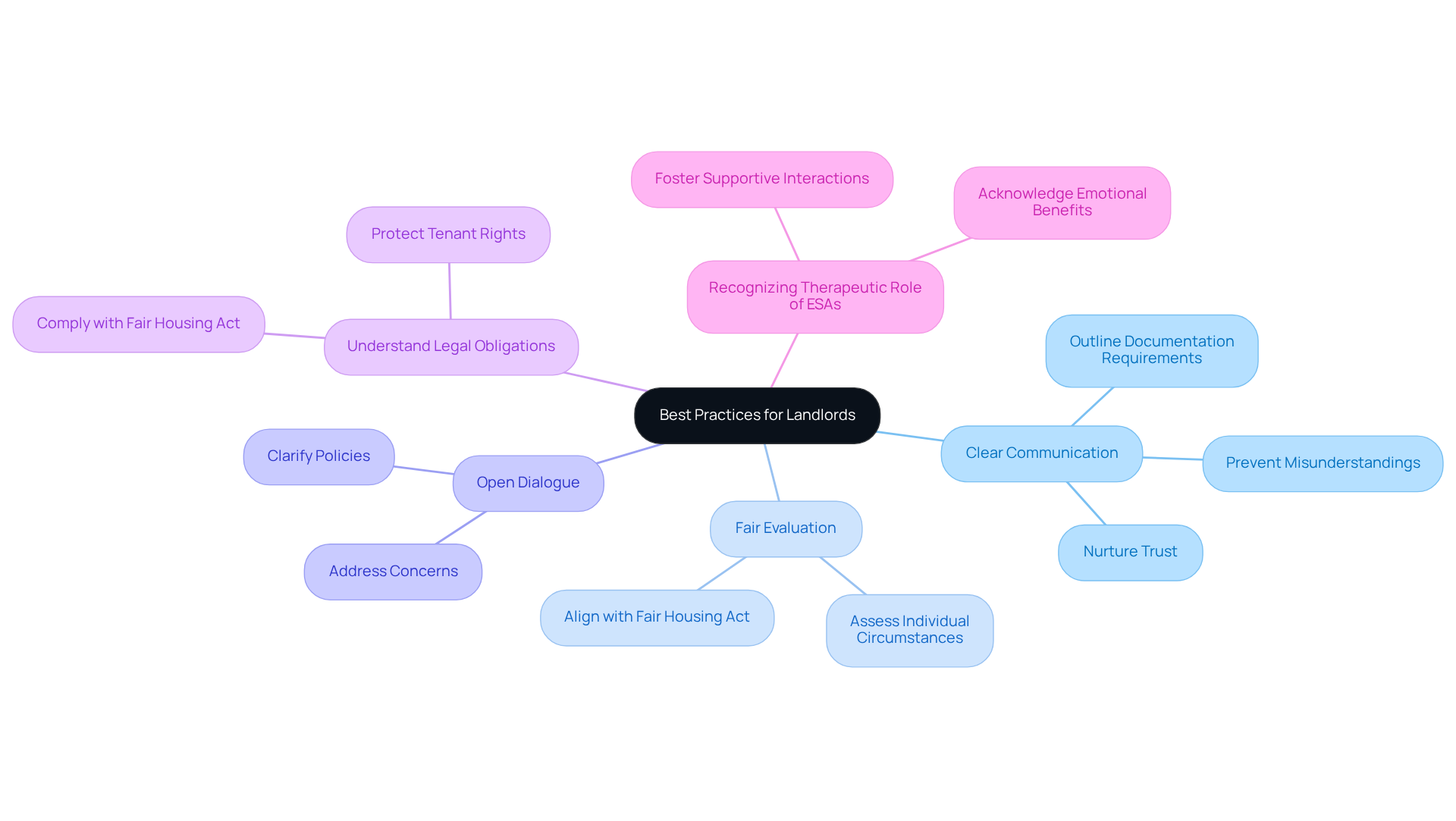
Conclusion
Understanding the legal landscape surrounding Emotional Support Animals (ESAs) is crucial for both tenants and landlords. For individuals facing mental health challenges, emotional support animals provide essential companionship and therapeutic benefits. Under the Fair Housing Act, they are exempt from pet deposits, ensuring that individuals can maintain their emotional support without incurring additional financial burdens. This allows them to focus on their well-being and healing journey.
The article highlights several key points, including:
- The distinction between ESAs and typical pets
- The legal obligations of landlords
- The documentation required to validate an ESA request
It emphasizes the importance of educating both tenants and landlords about their rights and responsibilities, dispelling common myths surrounding ESAs, and understanding local laws that may further protect ESA owners. By fostering an environment of compassion and understanding, landlords can enhance their relationships with tenants while ensuring compliance with legal standards.
Ultimately, awareness and advocacy are vital in navigating the complexities of emotional support animal policies. Individuals are encouraged to seek the necessary documentation and stand firm in their rights, while landlords must approach ESA requests with empathy and a commitment to inclusivity. By working together, a supportive living environment can be cultivated, allowing everyone to thrive alongside their emotional support companions.
Frequently Asked Questions
What is the purpose of Wellness Wag’s services?
Wellness Wag provides a streamlined process for obtaining Emotional Support Animal (ESA) letters, allowing individuals with mental health issues to secure documentation quickly, often within 24 hours.
How does the process for obtaining an ESA letter work?
Clients begin by taking a brief assessment to share their emotional support needs, followed by a personalized consultation with licensed medical professionals to evaluate their eligibility for an ESA. Upon confirmation, clients receive valid ESA letters that comply with legal requirements.
Do landlords have to allow Emotional Support Animals under the Fair Housing Act?
Yes, under the Fair Housing Act (FHA), property owners are required to provide reasonable accommodations for tenants with Emotional Support Animals, recognizing their essential role for individuals with mental health challenges.
Are Emotional Support Animals exempt from pet deposits or additional fees?
Yes, Emotional Support Animals are exempt from pet deposits and additional fees under the Fair Housing Act, meaning landlords cannot impose such charges.
What distinguishes Emotional Support Animals from regular pets?
Emotional Support Animals are specifically recommended by licensed mental health professionals to help alleviate symptoms of mental health conditions, whereas typical pets primarily offer companionship.
What legal protections do Emotional Support Animals have?
Emotional Support Animals are protected under the Fair Housing Act, which requires landlords to accommodate them, but they do not have the same protections under the Americans with Disabilities Act (ADA) that service animals do.
What should tenants do if their landlord refuses to accommodate their Emotional Support Animal?
Tenants should be aware that if landlords refuse to accommodate ESAs without lawful reasons, they may face penalties of up to $75,000. It is advisable for tenants to understand their rights and the legal framework surrounding ESAs.
How can individuals ensure they receive the necessary documentation for their ESA?
Individuals can ensure they receive the necessary documentation by utilizing services like Wellness Wag, which provides tailored assessments and consultations to help secure valid ESA letters.
Certify Your Emotional Support Animal Today

Why You Can Rely on Us?
At Wellness Wag, we believe your pet deserves care rooted in both science and compassion. Each article is carefully researched, written in clear language for pet owners, and then reviewed by qualified professionals to ensure the information is evidence-based, current, and practical for real-life care. Our goal is to help you feel confident in making informed decisions about your pet’s health and well-being.
Reviewed by
Angela Morris, MSW, LCSW
Angela is a licensed clinical social worker with 20 years of experience in patient advocacy and community mental health. She has assisted numerous clients with ESA evaluations and brings a deep understanding of disability accommodations, ensuring that all information is accurate, supportive, and practical.

Written by :
Lena Park
Last Updated :
August 17, 2025












